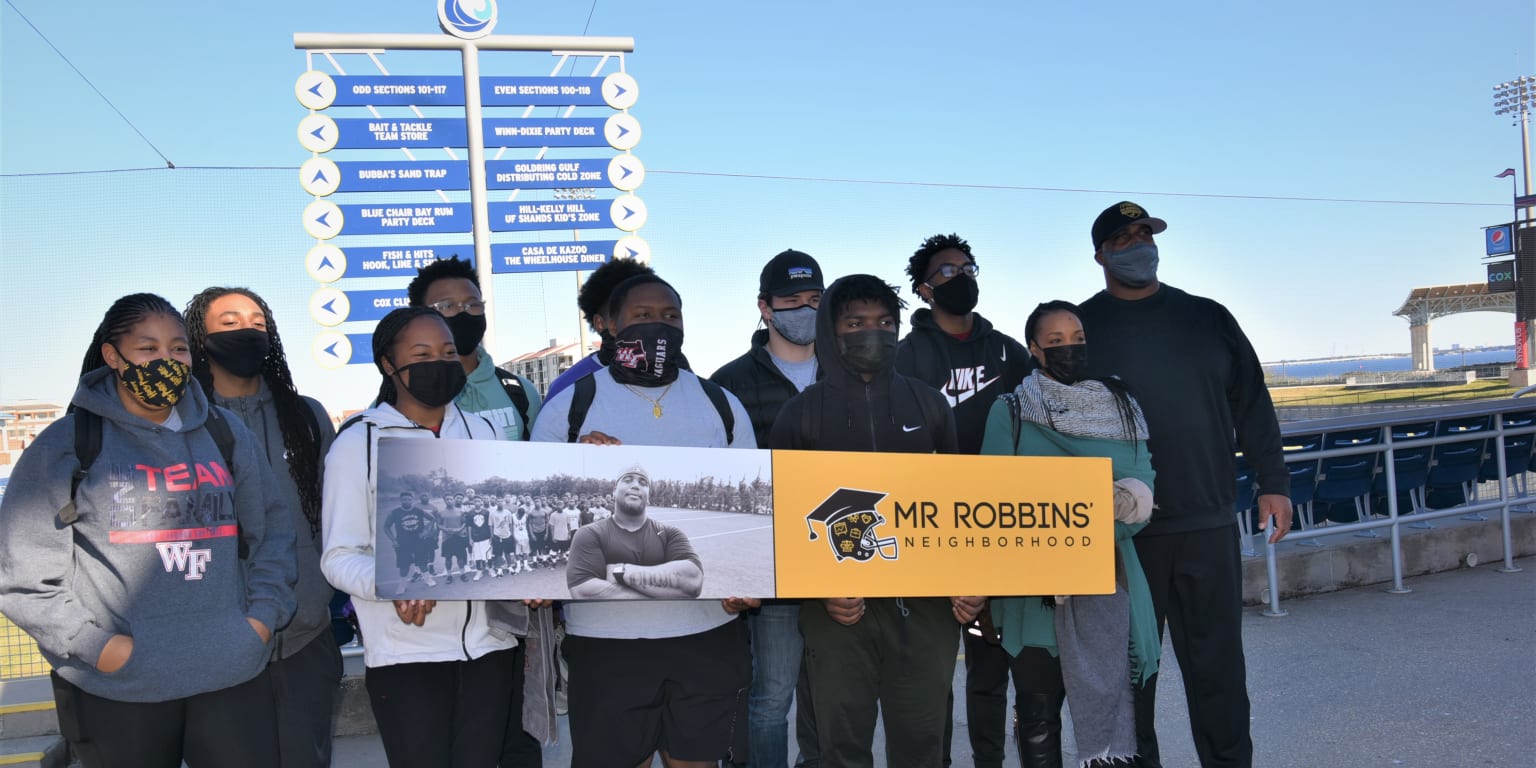Here is a link to the original story on the team's website.

 Crystal blue sky and the welcome return of warmer temperatures added to the experience, as members of Mr. Robbins’ Neighborhood gathered at Blue Wahoos Stadium.
Crystal blue sky and the welcome return of warmer temperatures added to the experience, as members of Mr. Robbins’ Neighborhood gathered at Blue Wahoos Stadium.
A group of area high school athletes in the Playbook Program were together Feb. 20 for the first time since the 2020 school year ended in June.
Several had never met each other. Most had only visited via Zoom conferences. The ongoing coronavirus pandemic forced limitations in an organization designed to mentor and educate young athletes about the necessity of preparing for a future beyond sports.
Now, finally, they were on a field, working out together, and in meetings at the stadium.
“I’m telling you, it’s great just to be outside again, be on a field again, be with these kids in person again. It means so much,” said Fred Robbins, the retired NFL defensive star, who co-founded the outreach program with his wife, Tia, as a way to mentor athletes, inform about getting into college and reinforce the importance of having a Plan B outside of sports.
“Those who are on Zoom, I know you are tired of Zoom,” said Robbins, addressing the group. “I am Zoomed out, too. This is way to get outside.”
Through the help of Blue Wahoos co-owners Quint and Rishy Studer, the stadium became a way to get outside. A way to get the athletes’ parents together, have the athletes go through some workouts, then gather for a meal inside the stadium’s lounge.
The athletes were also able to utilize the Blue Wahoos home clubhouse. It was a full afternoon and evening for the program members, something they have not had since COVID-19 affected everything.
“The kids needed it,” said Tia Robbins. “The program had to transition into everything being done virtually. And Mr. Studer brought up this up about using the stadium, and said, ‘Let’s make this happen.’
“Just having little fun is so important. And getting the parents together to give them information is so much easier to do this way.”
The athletes thanked the Studers in a Facebook video. Many of the athletes had requested to Fred Robbins about a way for the Playbook Program to meet outside on a field again.
“We were doing everything on just Zoom calls,” said Fred Robbins, who went from Tate High and Wake Forest into winning a Super Bowl as starting defensive tackle for the New York Giants. “We tried to get to a kid at a football game on Friday. And we try to get him on a Zoom call on Saturday morning.
“But we could just tell the focus wasn’t there. The good thing about it, is that some of them realized it, too. And they said, ‘Hey is there any way we can get together? These Zooms aren’t doing anything.’
“That is what this day is about.”
Before activities began, Fred and Tia met with the athletes to reinforce the importance of registering with the NCAA Clearinghouse, an online portal that is essential for being recruited and verifying academic eligibility.
As Tia pointed out to the athletes, there’s a case of one area athlete unable to get a scholarship simply because he did not register with the NCAA Clearinghouse.
“I don’t care if you have a 30 on the ACT, or a 4.5 grade point average,” Fred Robbins said to the athletes. “If you haven’t registered for the (NCAA) Clearinghouse, you are not getting in college. All you have to do is register. It is easy.
“But if I’m a college coach and I don’t see your name in the Clearinghouse, If I don’t see his name, I can’t recruit you. This is a way they can see your film, see who you are. Make sure you guys do it.”
Mr. Robbins’ Neighborhood is now in its seventh year. The athletes include football players, basketball players, baseball and soccer. This year, the Playbook Program welcomed the first are female athlete.
The idea was formed when Fred Robbins got injured late in his 12-year NFL career. As he was in the hospital after surgery, he realized what would happen if he could not return to playing. What now?
He wanted to make sure teenage athletes grasp the reality of long odds just to play college sports. And the percentage of athletes who ever rise from high school to earning a professional contract is miniscule.
It is why having a Plan B is vital.
“We’re now seeing some ours kids in the program in college now,” Tia Robbins said. “We’ve seen the difference this making with them.”
